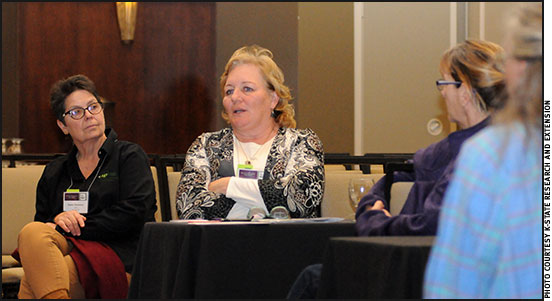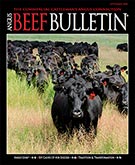
Sheila Govert (center) of Cunningham, Kan., participated in a breakout session at the 2018 Women Managing the Farm conference in Manhattan recently.
Traits of a High-functioning Family Farm
Women Managing the Farm Conference addresses current topics.
In his work as a county extension agent, Glenn Newdigger works with a lot of farm families and has come to recognize that successful farm operations tend to have common attributes. Among them is the willingness to accept differences in family members’ and employees’ backgrounds and experiences, and to communicate openly and with respect for one another, said Newdigger, who is based in Stafford County, Kan., with Kansas State University (K-State) Research and Extension. Many are willing to be flexible and take some amount of risk.
He, along with co-presenters Katelyn Barthol, extension agent in the Marais Des Cygnes District, and Mark Ploger, retired extension agent from Pratt County, spoke on the subject at the recent Women Managing the Farm conference in Manhattan. Other common threads of successful family farms are a willingness to share leadership, a focus on being in the business for the good of the whole operation, and the understanding that successes should be celebrated as a team.
Newdigger spoke about the stages farms go through and noted that even high-functioning farms can find themselves in places they don’t want to be, such as when a key family member or employee dies or leaves. Those stages and traits often linked to them include:
Gathering — This is where it’s decided why the business or group is together, an agenda is set, a leader or leaders are confirmed, and expectations and directions are agreed upon. This may sound formal for a family farm, but it sets the stage for establishing a business-like way to proceed. Remember, things change. At any given time in a farming operation, it might be a good idea to go back to this stage.
Chaos — In this stage, participants are determining the farm’s purpose. It can be marked by family members or employees jockeying for position or feeling left out. This is the time to determine a shared vision and to learn who can contribute what. Many events can throw even a smooth-running operation into chaos — the death of a participant, the inclusion of an adult son or daughter or new employee.
Unity — In this stage, the business is progressing toward its shared vision and working out differences. To keep it moving that way, this is a time to acknowledge accomplishments. Maybe that’s singling out the daughter who negotiated a better price on fertilizer. Maybe it’s the employee whose extra work resulted in more yield per acre or the spouse who updated the farm’s recordkeeping capabilities.
“Everyone wants to hear they’ve done a good job. That frequently gets forgotten on the farm,” one conference participant noted.
Performing — This is a time to celebrate the farm’s successes, whether it’s providing cash bonuses or throwing a party for employees, suppliers, customers or others. This is also a time to evaluate the farm’s work and processes and to learn from each other, and to start determining what’s next. That might include exploring new options — trying a new crop, selling a parcel of land, or starting a side business in agri-tourism.
Throughout the session, Newdigger encouraged audience members to provide their own insights into the categories. Continuous and clear communication, periodically revisiting goals, being open to including a mediator or other type of outside help, and food were topics that came up over and over again. Food is a unifier, participants said. Whether it’s coffee, donuts and fruit at an early morning meeting or a hot meal if the meeting is later in the day, it can be considered the very first step toward common ground among the farm business’s key players.
Kansas farmers have numerous resources available, Newdigger said, with answers for the occasional question, educational opportunities or support on an ongoing basis. A good place to start is the local K-State Research and Extension office. Other resources include the Kansas Farm Analyst program, Kansas Farm Management Association, and the Kansas Agricultural Mediation Service.

Editor’s Note: Mary Lou Peter is a communications specialist, news writer and editor for Kansas State University’s News Media Services.






